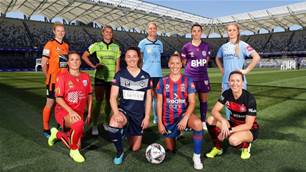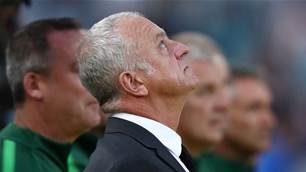Ode to an outgoing, outgoing executive...
Now I'm in a club here in the A-League
And the fans here all want me to know their name
And I can argue with Allia, Tony, or the FFA
But every f**king CEO sounds the same
(with apologies to both Paul Kellys)
For a Perth Glory CEO, Paul Kelly was a pretty honest guy. The latest in a line of previously unsuccessful club executives out west, Kelly brought three years of consistency, stability, and a no-nonsense approach that set him apart from his predecessors. Where other CEOs may have fobbed off enquiries from bloggers or internet hacks that were seen as below their station, or at the very most fed them with nothing replies and doublespeak, the former Irish youth goalkeeper was happy to chat - so long as it was his plans that you were going to talk about. As a fan, it was difficult to broach certain subjects with him - supporter meetings were told that the team, performances, and coaching staff were strictly out of bounds - and he brought an unusually brash and forthright tone to discussions. If he thought that something you said was idiotic, he'd tell you so without mincing words. As a result, he quickly put many people offside. But for others, the fact that you could at least have an honest dialogue with the CEO of an A-League club was a refreshing change.
Very early in my time writing for FourFourTwo I tried, without success, to get prior administrators, media men, and chief execs of Perth Glory to commit to anything - even a straight answer to a simple question. What was the club's vision? "We've got a very good vision". What was the attitude towards players from the state league? "We're looking at all options". How about meeting with the fans? "We might consider that - it depends". It was always the same; wishy-washy answers with the air of vagueness and generic claptrap that is the tool of poor middle-managers everywhere. Ask Paul Kelly the same questions, and he'd be just as likely to answer with a ten minute salvo on exactly what his vision for the club was; a blast at the state league for paying inflated wages to players who didn't deserve them, including a broadside at the FFA for not funding proper year-round football; and he'd agree to fan forums and stare people down if they said something he didn't agree with. What's more, when only a handful of fans would show up for such events he'd put the onus back on supporters for not following through on their supposed desires. Not bad considering that back in early 2011 the club's fans wondered what Kelly's role at the club even was, such was the media profile of Tony Sage and deputy chairman Lui Guiliani at times. At one point, The West Australian even jokingly referred to him as 'the quietest CEO in Australia'.
Yet the outgoing CEO was no shrinking violet; and whilst perhaps a little too confronting at times, Kelly was nevertheless the most useful CEO the club has had since it descended into FFA ownership and re-emerged under Tony Sage's original triumvirate of owners. He gave you answers, even if they weren't the ones you wanted to hear. He had time for bloggers and podcasters, where previous administrations had to use google to work out what they even were. Perhaps most importantly, he would admit that the club made mistakes - something unheard of amongst some other club employees during our A-League history. That alone is important; considering that A-League teams have fans, let alone employees, who think that each franchise administration can do no wrong. His impact and legacy may be debated by some supporters, but on the whole I'd have to say that he did a good job.
Kelly's reign coincided with a slow but steady increase in the club's performance on-field; albeit with close shaves with very poor form that may have seen a manager sacked in leagues that featured relegation. Winning their way to the grand final last year was the club's on-field peak under his rule, and it coincided with a upturn in fan morale and general buzz amongst the Perth public. The club's marketing improved; the membership packs arrived on time for once this year; and the Glory actually became serious about using social media to their advantage, instead of just mocking it as a waste of time (even if they have perhaps gone overboard lately). Impressively, the club also forged stronger links in the state league as it sought to provide social facilities for its members and reduce costs associated with training and youth team games. There was also the signing of a kit deal with Blades that, whilst questioned by some at the time, has produced decent-looking kits with good prices that have pleased everyone but the biggest football-fashion fanboy. The club also worked hard to better its links with the WA community through the establishment of its soccer schools and summer development programs. This period was also marked with a gradual release of powers to clubs and club owners by the FFA, and the establishment of the Joint Strategic Committee. There was even the prospect of the team competing in Asia for the first time, and the economic benefits that this would bring - but unfortunately the FFA's failure to adhere to AFC regulations and heed warnings has robbed the club of that.
It wasn't all plain sailing of course. Under his stewardship the club undertook 'internal reviews' that put staff and players through the wringer; there were some embarrassing transfer sagas such as Dean Heffernan's Chinese contract clause; player discontent would flare up, such as with Jamie Coyne's contract; and whilst on-field performances have improved with time, you would still be at a stretch to say that the club had a defined football philosophy or technical direction. Perhaps the biggest criticism that could be leveled at the club during Kelly's tenure as CEO would be around the 'cost-neutral' approach to managing finances. Rises in the prices of memberships - and their relative lack of value compared with other A-League clubs - was a sore point for many fans. A number of decisions around the supposed cost-cutting, and speeches to confirm them, were often contradicted by extravagant spends - overseas junkets for Sage or Kelly to 'learn' from big football teams in South America or Europe; or questions around the rental of the club's video screen and rumours of inflated crowd figures, as suggested by Allia Holdings - the company that runs nib stadium. Additionally, though the club was looking at cutting staff to save on administrative cost at various times, today there remains a questionable number of Personal Assistants that do - well, something you'd guess - at the club's offices and on matchday. Then there was the ever-present figure of Tony Sage himself, his controversies around Harry Kewell and his hob-nobbing of celebrities, and the seemingly countless threats to dump the club and walk away from the A-League.
It is this that onlookers must wonder about most of all; just how much impact did Tony Sage have on Kelly's work during his time at the club, and upon his decision to leave? There's no denying Sage is a passionate person, who on most occasions seems to have his heart in the right place - but it is his mouth which has got the mining magnate, and the club, into hot water in more than one instance. It was Sage who ordered Kelly to cut costs and review staff; it was he who said to scrimp on the wages of players and yet then chased names like Harry Kewell and David Beckham. More often than not, it was also Sage who entered public spats with Allia and former Glory owner Nick Tana. Despite Kelly's confrontational nature at times, one would imagine that the CEO would have preferred all of the above to be handled in a far more professional and business-like way; part of Glory's problem historically (in the A-League at least) is projecting an image of a shambling administration which is always reactive, rather than proactive, in how it goes about its business. Paul Kelly's time at the club brought more proactive measures to the fore; but even at the end of his term he finds himself in the midst of a Kewell rumour war and yet more tit-for-tat with Allia, a situation that Kelly himself has admitted is the club's biggest ongoing issue.
Whoever comes in to replace Kelly on a full-time basis will face the same problems - the man holding all the cash is emotionally unpredictable and given to celebrity whims; and he seems to be waging an eternal war with the keepers of the gate at the club's home stadium. Kelly's vision for the club was to be self-sustaining and to develop WA talent; yet when you do not own a stadium and your young players don't traditionally get much first-team time, progress can be slow and difficult. What would benefit Glory most in the long-term would be for someone to come in who can somehow convince Sage to take more of a back seat and fund the club whilst keeping his mouth shut. This of course is difficult, due both to the outgoing nature of the man himself and the difficulty that comes with telling one's own paymaster to sod off to the quiet room and let the 'professionals' do all the work.
The fact that Paul Kelly sat on the boards of three mining companies harks towards some sort of business - or at least industry - relationship with Tony Sage (although Kelly was also a FootballWest board member). Ideally, the club should be bringing in someone external to mining (though not football, ideally) who could provide new ideas and keep their distance from the club's owner. Whilst Lui Giuliani is another very approachable person within the club it's doubtful whether he's willing to play that role having spent so long on the board and around the club in general. Would it even be possible to recruit such a person? I for one am unsure.
In any case, for a club with a history of mediocre A-League administrators, Paul Kelly can take pride in the fact that he has left an impact on the club and its links in the community. His decisions weren't always popular; his temper was short on occasion; and there were certainly mistakes made under his watch - but at least he wasn't yet another plastic drone from the managerial wilderness, big on buzzwords and low on personality.
Proof perhaps, that not all A-League CEOs need sound the same.
Related Articles

Backlash over Fox Sports new season launch

W-League, A-League set for world-first equal marketing split













